| Reviews & Columns |
|
Reviews DVD TV on DVD Blu-ray 4K UHD International DVDs In Theaters Reviews by Studio Video Games Features Collector Series DVDs Easter Egg Database Interviews DVD Talk Radio Feature Articles Columns Anime Talk DVD Savant Horror DVDs The M.O.D. Squad Art House HD Talk Silent DVD
|
DVD Talk Forum |
|
|
| Resources |
|
DVD Price Search Customer Service #'s RCE Info Links |
|
Columns
|
|
|
X-Files: The Collector's Set
The (almost-)complete mythology of Mulder and Scully
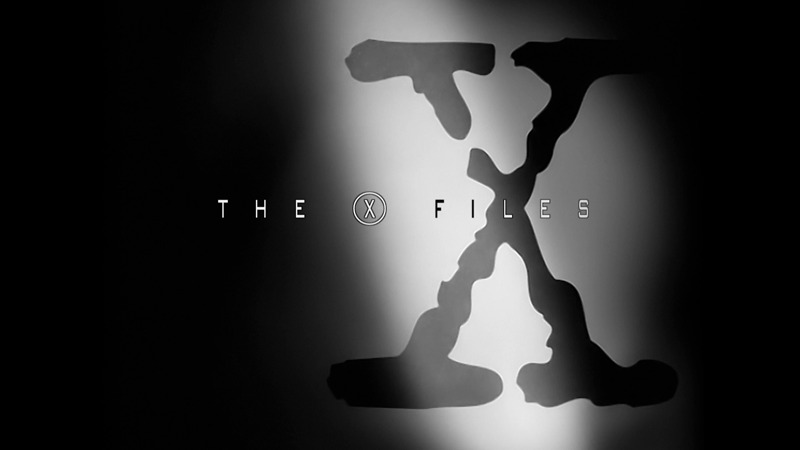
Reviewer's Bias*
Loves: The X-Files, cult television, sci-fi, The Lone Gunmen, "Blood"
Likes: conspiracy theories, David Duchovny, Gillian Anderson, complete series sets
Dislikes: Not getting new extras, expensive box sets
Hates: Shows that overstay their welcome, season nine, Krycek
The Story So Far...
A legendary cult television drama, The X-Files aired for nine seasons on FOX from 1993-2002 (along with a pair of theatrical films), tracking the investigations of FBI agents Fox Mulder (David Duchovny) and Dana Scully (Gillian Anderson), as they looked into all manner of unusual phenomena, in search of the truth, with a 10th season, in the form of a new miniseries, coming in 2016. The episodes in the nine original seasons have all been released in a variety of full-season and special collection DVD sets (between 2000 and 2008.) DVDTalk has reviews of most of those sets.
The Show
As the first episode of the new miniseries of The X-Files finished showing at New York ComicCon in October, a familiar feeling came rushing back. It was like traveling back to the Friday nights of 20 years earlier, when watching The X-Files was a weekly highlight, because you knew you were going to see something great, something exciting and something that you weren't seeing anywhere else on TV. It was easy to get sucked into the world of Mulder and Scully, because everything about the series, from the writing to the acting to the production, was simply top-notch. However, this feeling engendered by this new episode quickly gave way to the memory of what The X-Files eventually became: something very disappointing, something tired and something you didn't want to watch anymore.
This set, which collects the first nine seasons of the series, lets you ride the roller coaster, with all its extreme highs and frustrating lows, yet again. One of the things that made The X-Files work so well was the series' structure. Rather than approaching the show as a pure serial drama, telling the story of Mulder and Scully's investigation into the unknown week after week, unfolding twists and turns, the series mixed "mythology" episodes, which focused on the big-picture story of conspiracies, with "monster of the week" entries, which spent an hour on an individual case, usually centered around something weird and likely paranormal. As such, the show wouldn't get too bogged down in the long-running plot, servicing the story regularly, while offering standalone episodes that cleansed the palette and let those working on the show stretch their legs and stay fresh.
The mythology was naturally the backbone of the show, helping establish the characters and their backstories, while giving Mulder and Scully motivation to continue their efforts to find the truth behind the X-Files. Both agents have rather complex histories which we discover as the seasons roll on, though they both start off reasonably, as Mulder is motivated by the loss of his sister to what he believes was an alien abduction, while Scully is led by a belief in science. However, things get dramatically messy as they dig deeper, bringing them into contact with many elements that would do them harm, resulting in a slew of changes to their lives, not the least of which is their relationship with each other. Though an attempt to keep them as platonic co-workers is obvious, fans wanted their heroes to get together romantically, while the time and experiences they shared made it more likely that they would at some point give in to the tension between them.
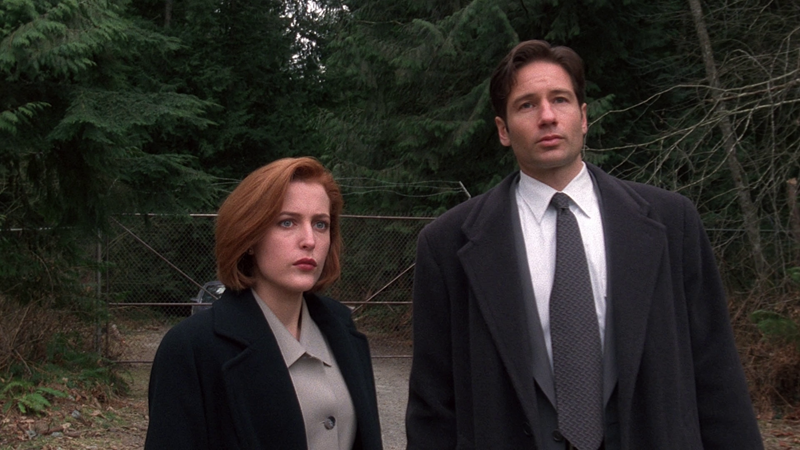
Though the deep conspiracies that swirled around the series were a key to the show's popularity, as stories about a creepy black oil that infects people and orifice-free, torch-wielding killers provided the mysteries that kept viewers returning, hopeful for answers, the one-off episodes are among the most memorable, as the creative staff, freed from the expectations that came with the mythology episodes, could push the limits of what The X-Files could be. If you were to come up with a list of the best episodes the show ever produced (a popular pastime online), aside from them coming mostly from the show's first five seasons, you'd find the vast majority are of the "monster of the week" variety, be it the horrifying hillbilly tale of "Home" (an episode so disturbing it was never re-run on FOX), the gorgeous black-and-white James Whale homage of "The Post-Modern Prometheus" or the witty late-run crossover with the reality show Cops ("X-Cops"). When the writers and directors cut loose (a frequent occurrence in early seasons), the results are often fantastic, whether they are aiming for frightening or funny (as some of the best episodes surprisingly end up.)
Part of that success was the talent on board, starting with series creator Chris Carter, who was behind the keyboard and behind the camera for several of the show's best outings. For such a long-running show, the circle of writers and directors was surprisingly small, with just four guys, led by Kim Manners' astounding 52 episodes, combining to direct over half the show's 202 episodes. That lent to the consistent feel (at least for the first half-dozen or so seasons) despite some very varied episodes, as well as some incredibly striking visuals, aided by impressive (especially for the tme) special-effects work. The artists at work here created moments that are unforgettable decades after they originally aired.
Fantastic writers like Carter, Frank Spotnitz, future Breaking Bad creator Vince Gilligan, Darin Morgan and the team of James Wong and Glen Morgan, among many others, including series stars Anderson and Duchovny, all helped to craft iconic, relatable characters in Mulder and Scully (who, for the most part, didn't betray their characterizations), while putting their own unique stamp on their episodes, which gave us shows like Darin Morgan's amazingly meta "Jose Chung's From Outer Space", Gilligan's terrific vampires-meets-Rashomon "Bad Blood", and Morgan and Wong's ever-tense take on The Thing in "Ice". Impressively, though working on a network series, and staying in tune with the mythology's seemingly never-ending mysteries, not every episode delivered a clean ending, with "Blood" being a wonderful example of how the show can get to a resolution, even while taunting an audience that wants to know what's actually happening.
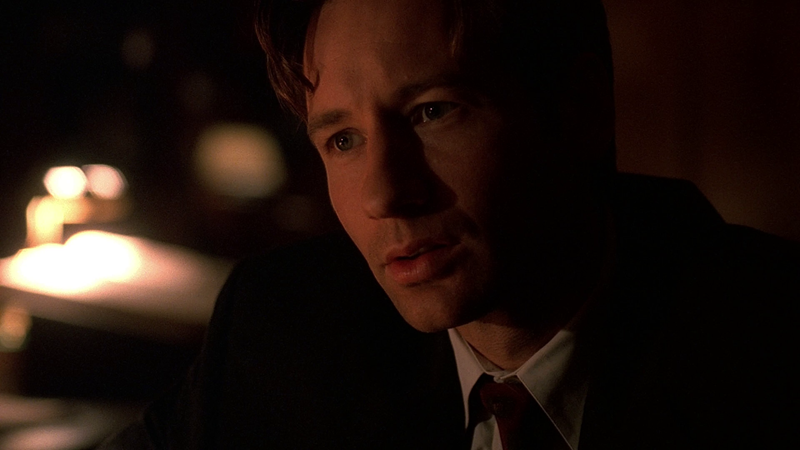
While the writers are great, great writing can easily die in the hands of a bad performer. In this area though, The X-Files was beyond blessed. In the leads, Duchovny's dry wit and Anderson's effortless gravitas served the show well in most situations, but they were adaptable as well, equally comfortable in high drama, all-out action and legitimate comedy, while still maintaining the reality of Mulder and Scully, no matter the situation. One scene where Scully screams at a suspect, unloading piles of personal grief, could have easily gone over the top, but instead just comes off as pure pain. Duchovny similarly wields a sarcastic sense of humor through most situations, but when he goes hard, it's completely believable as the other side of the Mulder coin.
Anderson and Duchovny are surrounded by a bevy of acting talent, which often made secondary characters into fan favorites, at times resulting in them being promoted from recurring roles to series regulars, as it was with Assistant Director Skinner (Mitch Pileggi), whose conflicted loyalties pitted him against or alongside the agents, depending on the situation, leading to Pileggi earning a sizable fan base. In the case of the Lone Gunmen, a trio of conspiracy theorist who helped Mulder and Scully on occasion and added some comic relief to the show, they even made the leap into their own series (which unfortunately made it through all of 13 episodes.)
However, no one made more of less than William B. Davis, whose attention-drawing silent early appearances, simply smoking a cigarette, would result in the creative staff turning him into what some have called the Darth Vader of The X-Files, a title that is more than fitting in a number of ways, with his machinations powering most of the series' mythology. Unfortunately, his character wore out his welcome over time, when, through coincidences and questionable plotting, not to mention increased dialogue that removes some of the mystery, he became less menacing and nearly morphed into a cartoon villain, especially when it became clear that everything and everyone in the show was related in some way, pushing the boundaries of believability. The same decrease in effectiveness can be seen in Alex Krycek (Nicholas Lea), a key nemesis to the team, who just kept coming back for more.
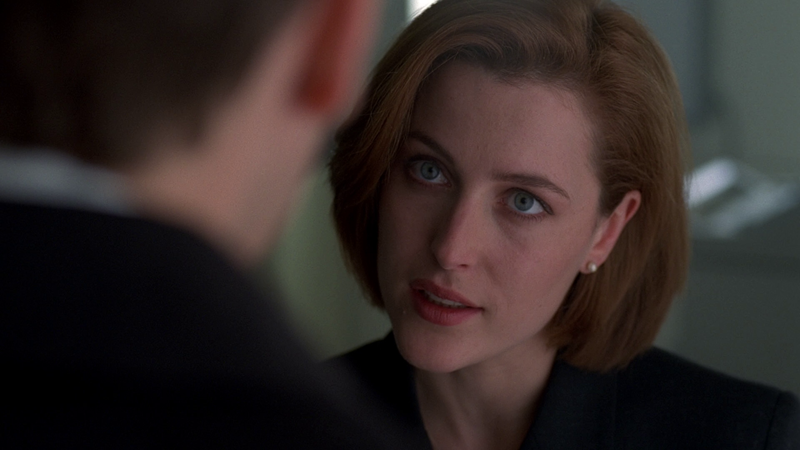
On the other hand, the special guests, with only a handful of appearances at most, were definitely a case of less is more. Among the big names to take a turn on The X-Files were Cary Elwes (as a new Assistant Director standing in the way of the X-Files), Michael McKean playing a delightful con man, the great Steve Railsback (The Stunt Man), Lucy Lawless, Bryan Cranston, an incredibly creepy Brad Dourif, Tony Shalhoub, Giovanni Ribisi and Jack Black sharing screentime, Peter Boyle as a psychic, Charles Nelson Reilly stealing an entire episode, John O'Hurley as a whacked-out doctor, Lily Tomlin and Ed Asner as a couple, Felicity Huffman and Lucy Liu in early roles, fantastic performances by Luke Wilson in a dual role and Bruce Campbell in a unique one, Garry Shandling and Tea Leoni as Mulder and Scully (!), Kathy Griffin, Burt Reynolds playing the role he was meant to play, Jesse Ventura, Alex Trebek, a young Shia LeBeouf, veteran film stars like Reuben Blade, R. Lee Ermey and M. Emmet Walsh, Ryan Reynolds (in one of his first American roles) and a voice performance by Jodie Foster. What's surprising is, despite the presence of so much notable talent, the rest of the cast kept pace, making their mark in the X-Files universe opposite legit stars, including writer Darin Morgan, who stepped out from behind the camera to play the lead in "Small Potatoes", a fan-favorite "monster of the week" episode.
It's generally accepted that after season five, the show just wasn't the same. (Some blame it on the production's move from Vancouver to Los Angeles, which, while having some possible drawbacks, seems like an easy target.) While there would be an episode or two that would stand-out (early in season six, Gilligan and Carter go back-to-back with memorable episodes "Drive" and "Triangle"), the alien abduction storyline was losing steam thanks to the many changes it would undergo as more and more revelations were made, some of which deserved an eyeroll. As that tale thankfully came to something of a conclusion, change would have to come to The X-Files.
The series had already been on a downslide heading into its final seasons, and the replacement of Mulder (who all but left the series) and Scully (who hung around in a less-featured role) with new agents John Doggett (Robert Patrick) and Monica Reyes (Annabeth Gish) represented the last straw for many fans (despite both actors doing nothing wrong, other than not being Mulder and Scully.) The problem was that, though often brilliant in its storytelling (particularly during the early days of the overarching conspiracy mythology), the show was truly character-driven, having long ago become more about the relationship between the two starring FBI agents, with the X-Files cases being more of an opportunity to spend more time with Mulder and Scully, than the reason to watch.
Remove Mulder and Scully from The X-Files after seven seasons and you rip the heart out of the series, but even worse, by keeping Scully around and allowing the specter of Mulder to continue haunting the storyline, the baton was never cleanly passed to the new characters, never allowing it to become their show and try something new (despite making an attempt in "Vienen", an episode teaming up Doggett and Mulder.) As such, viewers would keep comparing Doggett and Reyes to the admittedly superior pairing they followed. (That their mythology storyline, which felt less organic than the original, paled in comparison didn't help either.) This unfair perception of the new agents as either knock-offs or, worse, placeholders hampered the show's final two seasons, and an increasingly (and unnecessarily) convoluted storyline made sure anyone left watching were more likely to abandon ship than learn to love the newcomers. All that was left was to tie up loose ends, which it failed to do in several spots (though that's hardly a mortal sin for a series that trades in unsolvable mystery.) Rare is the show that goes out on top, and The X-Files is sadly the rule, rather than the exception.
Of course, with season 10, that may change...
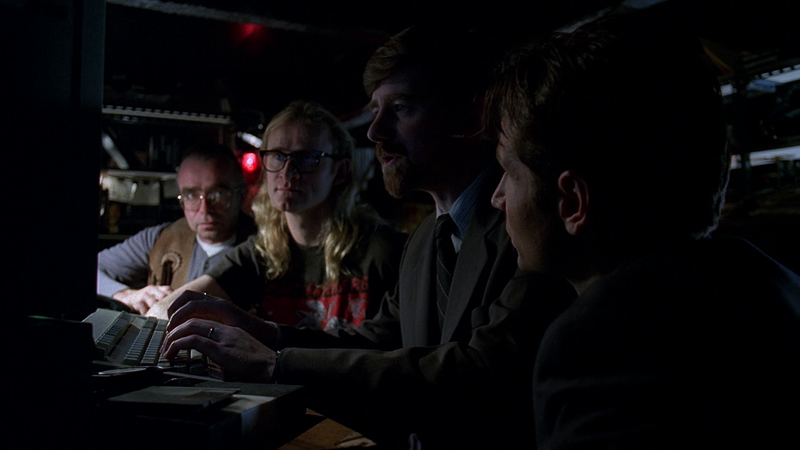
The Discs
The nine seasons of The X-Files are spread over 55 Blu-ray discs, held in eight extra-thick dual-hubbed Blu-ray keepcases with two dual-hubbed trays and one double-width Blu-ray keepcase with three dual-hubbed trays (for the longer second season.) Each case has an attractively-designed two-sided cover, with a disc guide on the inside. The nine cases are held in two columns, in a stylish, wide, four-sided die-cut box, which slides inside a glossy, stiff cardboard slipcase. The case has a removable insert which can eventually be replaced with the inevitable 10th season's release, as well as an insert permanently glued in place (apparently to balance out the thickness of the season two case.) The discs have clean animated menus based on the show's titles (accompanied by the iconic theme song), with options to select episodes, adjust the set-up, search through timelines and bookmarks and check out the extras. Audio options include English DTS-HD Master Audio 5.1, Spanish Dolby Digital 2.0 and French and German DTS 2.0 tracks, while subtitles are available in English SDH, Spanish, French and German.
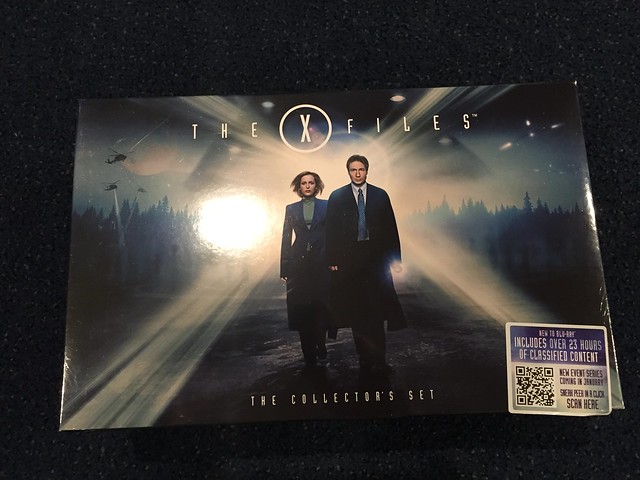
The Quality
The episodes are presented in 1080p, AVC-encoded 16:9 transfers, which, depending on your perspective, is excellent or terrible, because that's not the original aspect ratio for the first four seasons, which aired in 4:3 full-frame. That said, based on behind-the scenes footage and some of the featurettes, the show had been shot in 16:9 with 4:3 safeties, while special effects shots were composed in 16:9 and cropped to 4:3. As such, the 4:3 presentation seems to be more of a technical presentation limitation than a creative decision. As such, these transfers should be greeted with open arms (interestingly, the upcoming Freaks and Geeks Blu-ray release will offer both the aired 4:3 and the filmed 16:9 versions.)
Overall, the film material shot for the show looks great, with good clarity, an impressive level of fine detail, appropriate color and solid black levels (for the most part The X-Files is a rather dark show) while a consistent layer of grain and no obvious issues with digital distractions result in a pleasing image. The series was often experimental, trying black and white and other different looks, and it made use of a variety of archival or stock material, some of which doesn't look quite as good as the base film in the show. The only real downside to this presentation is the show's CG, which never really looked great, but which looks almost comical (particularly the worms in Ice) in the clarity Blu-ray offers. The series has never looked this good.
After watching so many TV shows that treat surround sound like an afterthought, the 5.1 DTS-HD Master Audio tracks here are a treat, taking full advantage of the show's more bombastic moments to craft engaging soundscapes that utilize all the channels to put the viewer in the moment. Atmospheric effects are heard in the side and rear channels, while music and sound effects get a boost from the surrounds, with the iconic theme songs sounding fantastic in the surround mix. The low-end is not a huge element, but the overall feel is great, with a clear, thick sound that offers no concerns.
The Extras
Sadly, there are no new extras in this set that weren't available on previous DVD releases of the show (if anything, you get less, since the DVD Ultimate Collection included the film Fight the Future.) With the exception of that film though, everything else is included here, so there's over 23 hours of bonus content spread over these Blu-rays (though it's presented in standard definition.) Much of the content is fantastic and will appeal to the show's fans and the curious alike, but some ends up as overkill when brought together from across the nine original season releases. It quickly becomes obvious that the extras decreased with each subsequent season, until Season Nine returned the bonus content to glory.
One of the big inclusions is the selection of 32 audio commentaries, with a handful for each season, mainly accompanying key episodes. There's a lot of variety amongst the participants in the tracks, from creator Chris Carter to directors R.W. Goodwin, Rod Hardy and Kim Manners, to writer/producers like Vince Gilligan and Frank Spotnitz. Anderson is on hand for an episode (the one she wrote and directed) while Patrick sits in for his debut episode, and both are enthusiastic and talkative. Some of the commentaries are definitely better than others, as Anderson, Gilligan, Hardy and Spotnitz have plenty to say (including a story involving Anderson and a large rubber phallus), but Carter and Manners can get caught watching, leaving decent-sized gaps of dead air. Some episodes pair up commentators, to good effect thanks to the opportunity for give and take, as Patrick joins Manners on one track and Manners teams with Carter on another, resulting in good conversation; director Rob Bowman sits with writer Darin Morgan, while Gilligan, Spotnitz and John Shiban share a friendly, regret-tinged chat about the last Lone Gunmen episode they wrote. Each track has its own style and focus, ensuring that a good deal of ground is covered in terms of the entire series, though across the spread of extras you will hear several stories repeatedly. Did you know that Duchovny runs very fast? You sure will after watching this set.
"Deep Throat" - Chris Carter
"The Erlenmeyer Flask" - R.W. Goodwin
"Duane Barry" - Carter
"End Games" - Frank Spotnitz
"Anasazi" - R.W. Goodwin
"Apocrypha" - Kim Manners and Carter
"Jose Chung's From Outer Space" - Rob Bowman and Darin Morgan
"Talitha Cumi" - Goodwin
"Memento Mori" - Spotnitz
"Memento Mori" - Bowman
"Max" - Manners
"Small Potatoes" - Vince Gilligan
"The Post-Modern Prometheus" - Carter
"Patient X" - Manners
"The Red and the Black" - Carter
"The Pine Bluff Variant" - John Shiban
"Triangle" - Carter
"Two Fathers" - Manners
"One Son" - Spotnitz
"Milagro" - Manners
"Closure" - Manners
"First Person Shooter" - Carter
"All Things" - Gillian Anderson
"Je Souhaite" - Gilligan
"Within" - Manners and Robert Patrick
"Deadalive" - Spotnitz
"Vienen" - Rod Hardy
"Alone" - Spotnitz
"Existence" - Manners
"Improbable" - Carter
"Jump the Shark" - Gilligan, Shiban and Spotnitz
"The Truth" - Manners
Over the course of the first seven seasons, nine introductions (seemingly taken from other shorter collections) were included for specific episodes, courtesy of Spotnitz and Carter (running 14:44 in total.) Though brief, they do setup why the episodes are important, and they should be watched to see a special appearance by a fan favorite. Unfortunately, you might miss them, since the only way to find them is to navigate to viewing those single episode.
Each of the nine seasons is accompanied by a featurette titled "The Truth About Season…" (running a combined 2:55:03) which feature interviews with cast, crew and guest stars, covering key themes, storylines and real-world elements (like the production's move to Los Angeles following Season Five and struggles with censors). Similarly, 18 season-focused featurettes are spread across the first three seasons, titled "Chris Carter Talks About…" (84:10 in all), which offer the series creator's thoughts about the show, like details of the plots, production info and discussion of the people involved (including shooting around a pregnant Anderson), as well as a number of general series elements. Carter wasn't the only one getting a chance to talk though, as Season Four tried something different with short interviews with Spotnitz (1:47), James Wong (2:20), Gilligan (2:16 & 1:38) and Carter, focusing on specific episodes. Combined with the "Truth About" featurettes, these are the next best thing to getting more commentaries.
More info about what goes into making The X-Files can be found in "The Making of ‘The Truth'" (69:75/S9), an in-depth exploration of the series finale's production, covering prep, shooting and post-production, with a bonus look at the show's 200th-episode celebration Few behind-the-scenes pieces capture collaboration the way this one does, and that it also covers the end of an era makes for a great documentary. For more of a formal look at the finale, the 13:12 "Reflections on ‘The Truth" (S9) brings interviews with the stars and plenty of the emotion of saying goodbye, along with some bonus Burt Reynolds.
If you're looking for deleted scenes, this set has them in bulk, 69 in all, running a combined 2:06:06. Depending on which season you're watching, they could be served without comment, with forced commentary by Rabwin or with optional commentary from Carter, Spotnitz, Carter and Spotnitz or Spotnitz and Shiban. There are a few notable moments in this pile of excised material, including two scenes featuring different actors than the performances that aired, a cut early kiss between Mulder and Scully, an argument between Skinner and the Cigarette Smoking Man and an emotional moment between Scully and her mother. However the best part of these scenes is usually the commentary, as the explanations for why the scenes were cut are why fans are watching them. It's worth noting that the presentation of these scenes is pretty terrific, as they include the moment before and after the cut scene in black and white, so as to put the color deleted scene in context.
Also in the deleted realm is the alternate audio for the cold open of "Home," which was forced out by FOX's standards and practices folks, and which remains truly disturbing. Listen if you dare.
Some of the most engaging extras in this set are the 62 special-effects clips (1:36:46), which (with the exception of the first segment) are provided with non-optional commentary, first from visual-effects producer Mat Beck and then later from producer Paul Rabwin. There's a little bit of everything in these informative peeks at how the show's visuals were achieved, whether it's the use of mattes, fire effects and various digital fakery. Getting to see various takes and the process that led up to the final product is what makes these clips so interesting. Three additional behind-the-scenes clips (2:13/S2), one with commentary from Carter, show some additional work done to achieve some memorable moments.
The international clips are an interesting idea at first. For the lingually-curious, there a variety of clips in a number of different languages. It's amusing to hear some of the performances in a foreign tongue, particularly when you hear an iconic performance recast in a very different way (Teutonic Mulder and Scully are a personal favorite, followed by Japanese Skinner and the Italian Lone Gunmen.) Somehow the Cigarette Smoking Man is less threatening in German and we get to hear German and Italian spoken through an electronic voicebox. However, after a few season's worth of these clips (there's 182 in all), they become less intriguing and just more of the same. Each language's clip comes from a different scene, so you can't really compare and contrast. Switching between languages in a single scene might have been more interesting and more efficient. Unfortunately, there's not a lot of consistency, as you sometimes get Italian, and sometimes you don't, while the Spanish clips seem meaningless, since these discs have Spanish audio tracks available. (Perhaps someone noticed, as later seasons mostly eliminate the Spanish track.)
- "Pilot" - German (1:13), Italian (:54), Japanese (1:03) and Spanish (1:05)
- "The Jersey Devil" - German (1:03), Japanese (1:16) and Spanish (1:22)
- "Ice" - Italian (1:08), Japanese (1:05) and Spanish (1:03)
- "Space" - German (1:12) and Japanese (:58)
- "Fire" - Italian (1:05), Japanese (:59) and Spanish (:52)
- "Beyond the Sea" - German (1:10), Italian (1:05), Japanese (1:08) and Spanish (1:23)
- "E.B.E." - German (1:06), Italian (1:04), Japanese (1:25) and Spanish (1:01)
- "Tooms" - German (:48), Italian (1:08), Japanese (1:04) and Spanish (1:18)
- "The Erlenmeyer Flask" - German (:57) and Japanese (:56)
- "Duane Barry": German (1:24), Italian (1:09), Japanese (1:28) and Spanish (:38)
- "One Breath": German (1:00), Italian (1:04), Japanese (:55) and Spanish (1:24)
- "Irresistible": German (:52), Italian (1:05), Japanese (1:14) and Spanish (:55)
- "Humbug": German (1:22), Italian (:56), Japanese (1:15) and Spanish (:52) (Note: the Spanish clip is actually silent)
- "Anasazi": German (1:10), Japanese (1:04) and Spanish (1:10)
- "Paper Clip": German (1:06), Italian (1:01), Japanese (:55) and Spanish (1:08)
- "The Walk": German (1:03), Italian (1:55), Japanese (1:10) and Spanish (1:01)
- "War of the Coprophages": German (1:02), Italian (1:05), Japanese (1:02) and Spanish (1:04)
- "Piper Maru": German (1:05), Italian (1:02), Japanese (:59) and Spanish (1:02)
- "Pusher": German (1:03), Italian (1:04), Japanese (1:07) and Spanish (1:01)
- "Talitha Culi": German (1:08), Italian (1:00), Japanese (1:01) and Spanish (1:01)
- "Home": German (:48), Japanese (1:27) and Spanish (1:03)
- "Tunguska": German (1:07), Japanese (1:24) and Spanish (1:23)
- "Paper Hearts": German (1:03), Japanese (1:05) and Spanish (1:18)
- "Momento Mori": German (1:04), Japanese (1:18) and Spanish (1:24)
- "Tempus Fugit": German (1:07), Japanese (:57) and Spanish (1:11)
- "Gethsemane": German (1:20), Japanese (:47) and Spanish (:36)
- "Redux": German (:54), Italian (1:02), Japanese (1:31) and Spanish (1:12)
- "Christmas Carol": German (2:05), Italian (1:08), Japanese (1:25) and Spanish (1:28)
- "Kill Switch": German (1:20), Italian (1:09), Japanese (:56) and Spanish (:51)
- "Patient X": German (1:19), Italian (:54), Japanese (:51) and Spanish (1:10)
- "The End": German (:54), Italian (1:14), Japanese (1:26) and Spanish (1:25)
- "The Beginning": German (1:20), Italian (1:33), Japanese (1:02) and Spanish (:45)
- "Dreamland II": German (1:27), Italian (1:01), Japanese (1:35) and Spanish (1:39)
- "Two Fathers": German (1:20), Italian (1:01), Japanese (:35) and Spanish (1:05)
- "Arcadia": German (1:05), Italian (1:19), Japanese (1:04) and Spanish (:50)
- "Three of a Kind": German (1:04), Italian (1:18), Japanese (1:11) and Spanish (1:23)
- "Biogenesis": German (1:09), Italian (1:16), Japanese (1:05) and Spanish (1:02)
- "The Sixth Extinction II: Amor Fati ": German (1:39), Italian (1;15), Japanese (00:55) and Spanish (0:47)
- "The Amazing Maleeni": German (1:05), Italian (00:57), Japanese (1:42) and Spanish (00:50)
- "Closure": German (1:56), Italian (1:40), Japanese (1:55) and Spanish (1:29)
- "En Ami": German (1:13), Italian (1:07), Japanese (1:46), and Spanish (1:13)
- "Hollywood A.D.": German (00:40), Japanese (1:33) and Spanish (1:43)
- "Requiem": German (2:32), Japanese (1:56) and Spanish (1:35)
- "Within": German (00:57), Italian (00:56) and Japanese (1:27)
- "Via Negativa": German (2:09), Italian (2:17) and Japanese (1:24)
- "The Gift": German (1:27), Italian (1:36) and Japanese (2:10)
- "Three Words": German (1:41), Italian (2:10) and Japanese (1:34)
- "Essence": German (1:46), Italian (00:56) and Japanese (1:56)
- "Existence": German (2:04), Italian (1:24) and Japanese (2:01)
- "Nothing Important Happened Today II": German (2:34), Italian (1:52) and Japanese (1:25)
- "Trust No 1": German (1:56), Italian (2:02) and Japanese (1:43)
- "Provenance": German (2:02), Italian (1:16) and Japanese (1:37)
- "William": German (1:36), Italian (00:35), Japanese (2:15) and Spanish (1:05)
- "The Truth": German (1:27), Italian (1:47) and Japanese (1:55)
Previously available on the mythology collection releases (and in the Ultimate Collection) are the four "Threads of Mythology" featurettes, (1:53:23) covering the four themes in the show's core storyline: "Abduction" (S3), "Black Oil" (S5), "Colonization" (S8) and "Super Soldiers" (S9). Interviews and a chronology of episodes explain the core elements of the key storylines, but sometimes the focus gets a little lost, particularly in the final entry, which gets caught up in the idea of the series' ending. Otherwise they offer solid overviews of the show's mythology.
Additional overviews are available in the form of the Inside The X-Files (45:29/S5), Secrets of The X-Files (42:58/S9) and More Secrets of The X-Files (45:02/S9) TV specials which served mainly to give newcomers to the show a chance to catch up and get acclimated to the complex storylines (and in the case of Inside, to promote the upcoming movie.) Straightforward explanations of all the main players and storylines offer a handy jumping-on point, and an opportunity for long-time fans to refresh themselves. Though there's some behind-the-scene peeks included, you're not going to learn any real secrets though. The same goes for the "X-Files Profiles" (50:53/S6-S9), eight short looks at secondary characters like Samantha Mulder and Gibson Praise, which originally appeared on international mini-collections. Through interviews and show clips, these characters and their key episodes (naturally the ones on the original releases) get a bit of a spotlight.
"Reflections on The X-Files" (17:42/S9) lets some of the show's famous fans and some one-time guest stars, including Cher, Kevin Smith, Kristen Davis, Martin Landau, Bryan Cranston, Donal Logue, Burt Reynolds, Peter Boyle, Mimi Rogers, Alex Trebek, Ed Asner and musicians The Dust Brothers, talk about their interest or involvement in the series, in a rather entertaining featurette highlighted by Cher's regrets and Trebek's memories of riding with "The Body."
To see the core crew in a more relaxed setting, check out their panel at WonderCon 2008 (26:48/S9) to promote the second film, with the two stars, Carter and Spotnitz. The Q&A displays Anderson and Duchovny's senses of humor well, but the presentation is very choppy, as the con-goers asking the questions were cut out, replaced by on-screen text questions.
The bonus content wraps up with promo content, including two short fluff pieces, "FOX Behind the Scenes" (2:01/S6) and an FX featurette (1:54/S5), and the 50 "Behind the Truth" pieces (52:05/S2-S5) that were tied to the show's syndication run on FX. For what were basically ads, these quick-hit pieces of content were actually rather solid, touching on characters, actors, and crew members' responsibilities, and having some fun with them. Among the more interesting entries are an interview with author William Gibson, a look at the wardrobe and a set tour, as well as some discussion of Mulder's pornography collection. Then there's 398 television commercials for all nine seasons' worth of episodes (mostly 10 or 20 seconds long), spread across the nine sets, running nearly 110 minutes in total. The nostalgia factor ("Friday at nine, eight central") is the key for these promos, but the most interesting element here is the change that occurs in the promos over the course of the show's run, becoming increasingly stylish along the way.
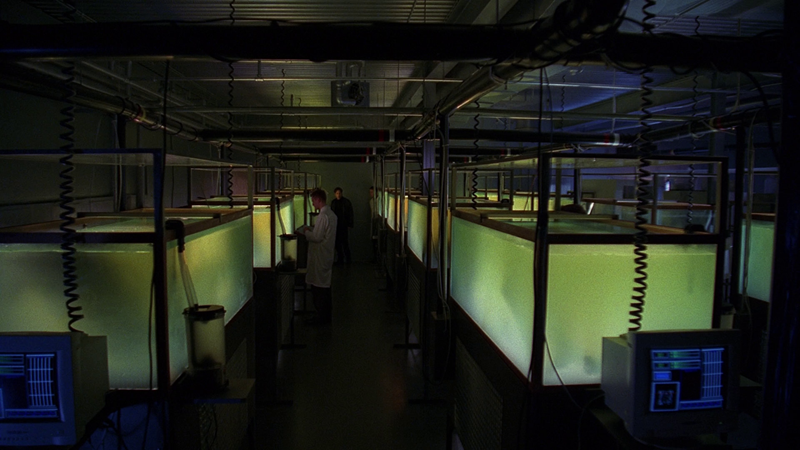
The Bottom Line
The X-Files is rather timeless, remaining just as engaging more than 20 years after it first aired, even if the show experienced diminishing returns in later seasons. The episodes look and sound fantastic (though the CGI looks more obvious now) and all the extras previously available (both the outstanding and the excessive) are here, but the two films are not included, nor are any new extras. At last check, buying the seasons individually, which means the only thing you're missing out on is the box, will cost you about $100 less (and you don't even have to buy season nine, though it boasts the most extras.) As such, it's easy to say you should pass on this complete collection, which is a real disappointment (nearly as big as that delivered by the one-time finale.)
Francis Rizzo III is a native Long Islander, where he works in academia. In his spare time, he enjoys watching hockey, writing and spending time with his wife, daughter and puppy.Follow him on Twitter
*The Reviewer's Bias section is an attempt to help readers use the review to its best effect. By knowing where the reviewer's biases lie on the film's subject matter, one can read the review with the right mindset.
|
| Popular Reviews |
| Sponsored Links |
|
|
| Sponsored Links |
|
|
| Release List | Reviews | Shop | Newsletter | Forum | DVD Giveaways | Blu-Ray | Advertise |
|
Copyright 2024 DVDTalk.com All Rights Reserved. Legal Info, Privacy Policy, Terms of Use,
Manage Preferences,
Your Privacy Choices | |||||||













